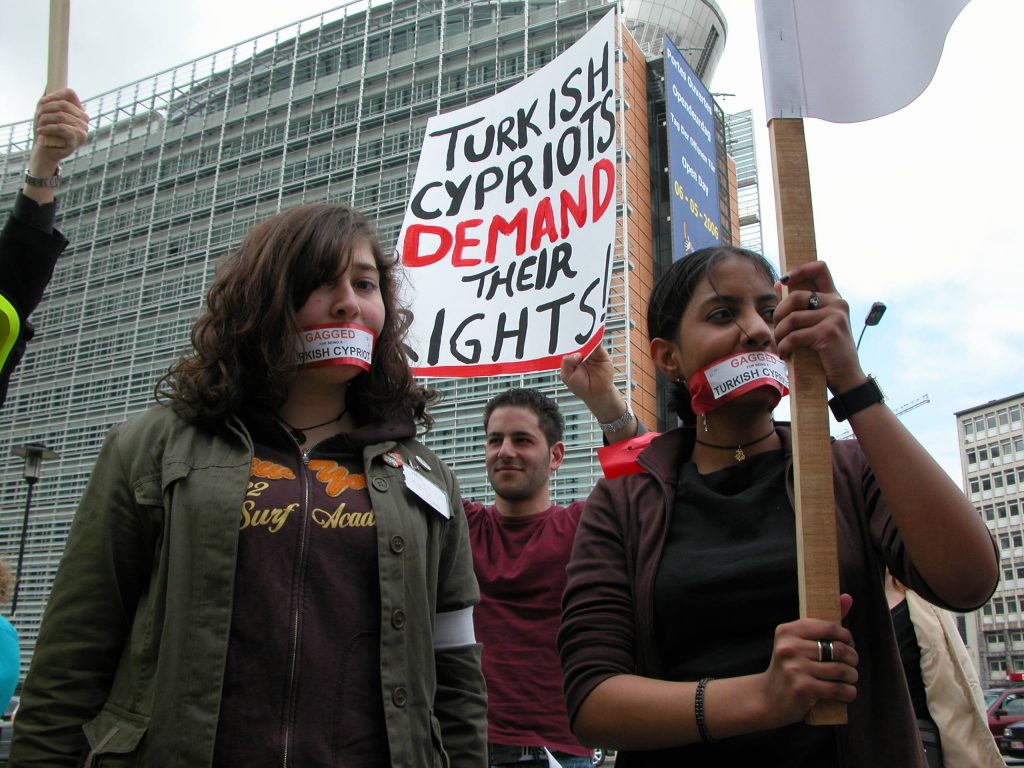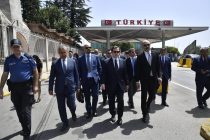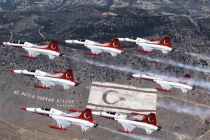Did you know that Turkish Cypriots have been deprived of their political, economic and social rights since 1964?
Turkish Cypriots are the co-founders of the Republic of Cyprus, a small island in the Eastern Mediterranean. The island became independent from British rule in 1960 and a new power-sharing state was created between Cyprus’ two largest communities: the Turkish and Greek Cypriots.
When Turkish Cypriots refused to give up their constitutional veto rights, they were brutally pushed out of power in December 1963 and have been internationally isolated ever since.
Nearly 60 years on, they cannot trade, travel or communicate directly with the rest of the world, and are also barred from participating in high profile international sporting events like the Olympics.
Here are ten facts about these unjust embargoes and why it’s vital the world helps end them, so Turkish Cypriots can enjoy the same rights and opportunities as Greek Cypriots.
-
UN Resolution 186, 4 March 1964, and the start of the embargoes
The conflict in Cyprus broke out in December 1963, when the larger Greek Cypriot population attacked Turkish Cypriots and seized power. Hundreds of Turkish Cypriots were killed and tens of thousands made homeless in the weeks that followed. When mediation failed to stop the bloodshed, the United Nations proposed to send an international peacekeeping force.
The UN Security Council ratified this arrangement at their 1102nd meeting on 4 March 1964, when members unanimously passed Resolution 186. However, this poorly worded resolution changed the balance of power in Cyprus by referring to the Greek Cypriots as “the Government of Cyprus”, while relegating Turkish Cypriots to the status of a “community”, with huge ramifications.
The resolution’s wording went against the Cyprus Constitution and the terms of the international treaties that established the Republic of Cyprus in 1960. The Republic was formed by the Greek Cypriots and Turkish Cypriots as a power-sharing state, with each community regarded as politically equal and possessing the right of veto.
Turkish Cypriot politicians Rauf Denktaş & Osman Örek, at the Cyprus conference at Marlborough House, London, 15 Jan. 1964
In one fell swoop, the UN’s 4th March resolution not only gave Greek Cypriots the green light to continue as the sole recognised authority on the island, but also deprived Turkish Cypriots of their inherent legal and political rights.
-
If you don’t exist politically, you don’t exist at all
UN Resolution 186 not only inadvertently denied Turkish Cypriots a political seat at the UN, but also a voice and representation elsewhere.
Many global institutions are linked to the UN, so if you are not represented there, you cannot have representation on bodies such as the World Health Organisation (WHO) or the International Civil Aviation Organisation (ICAO).
Turkish Cypriots are excluded from global sporting bodies like the International Olympic Committee (IOC), and their democratically elected politicians are unable to represent them at the European Parliament, despite Cyprus being a member since 2004.
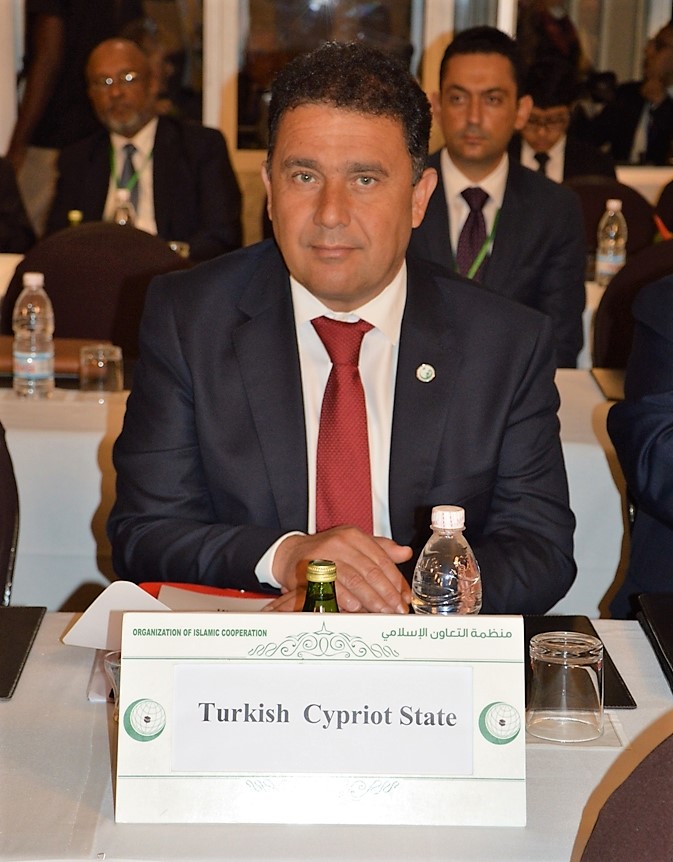
Some international bodies have tried to overcome this injustice by offering Turkish Cypriots “observer” status until the Cyprus dispute is resolved.
Since 1975, the Organisation of Islamic Cooperation (OIC), for example, has allowed Turkish Cypriot representatives to participate in its various forums. The organisation decided to formally confer “observer” status to the “Turkish Cypriot State” at an OIC meeting of Foreign Ministers in Yemen in 2005.
-
UN call for non-recognition of TRNC runs counter to its own Charter promoting self-determination as a human right
Despite knowing the realities in Cyprus, the UN insists there can only be one internationally recognised state on the island – the Republic of Cyprus – which has been hijacked by the Greek Cypriots.
There have been numerous UN-led negotiations and plans to restore power-sharing in Cyprus – each one rejected by Greek Cypriots, who have little incentive to change the state of affairs.
Turkish Cypriots tried to escape this political limbo by declaring their own state, the Turkish Republic of North Cyprus (TRNC), on 15 November 1983.
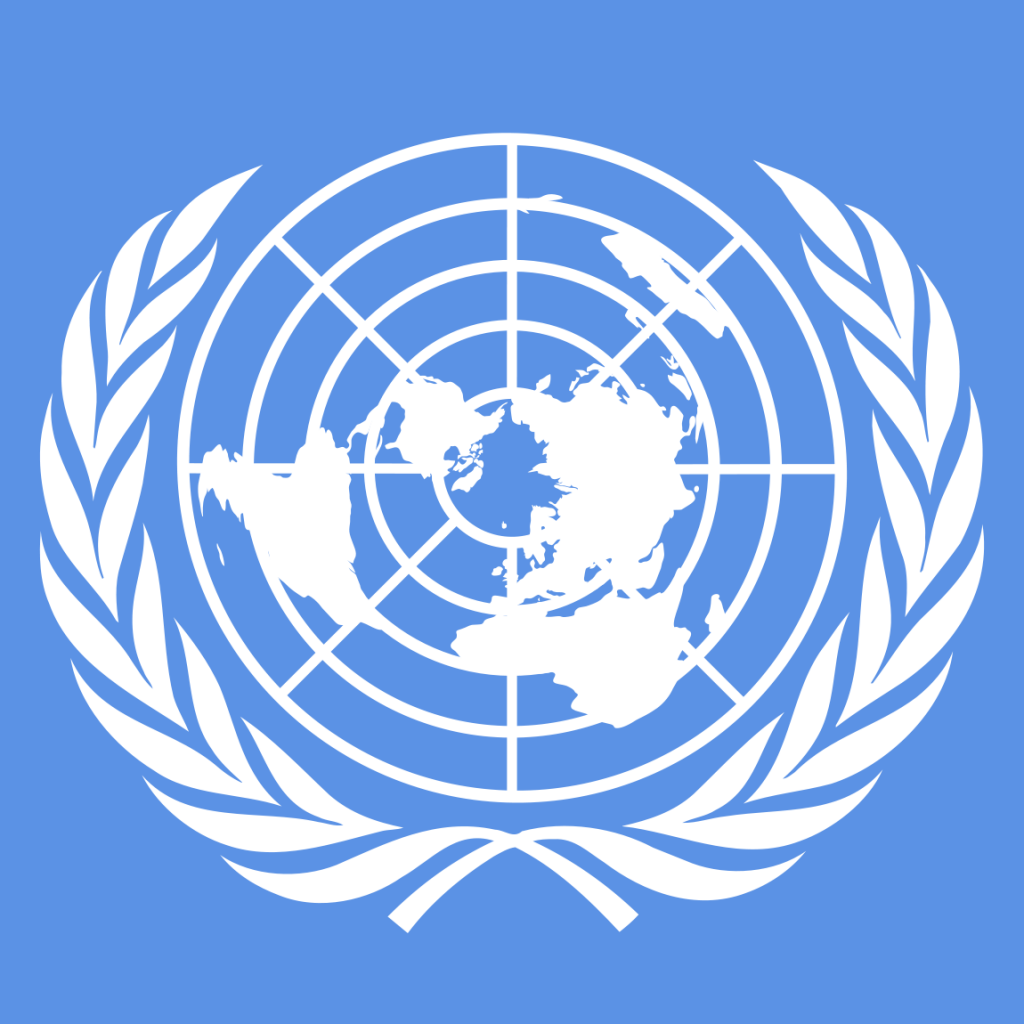
Deemed a “secessionist act”, various UN Security Council Resolutions called for the non-recognition of the TRNC, including Resolutions 541 (1983) and 550 (1984), which described the declaration of the TRNC as “legally invalid”.
Yet these resolutions run counter to the UN’s own Charter and fundamental aim to facilitate self-determination:
“To develop friendly relations among nations based on respect for the principle of equal rights and self-determination of peoples, and to take other appropriate measures to strengthen universal peace,” [UN Charter, Article 1, Clause 2].
The resolutions also go against international treaties, such as the International Covenant on Civil and Political Rights (ICCPR) of 1966, which states in Article 1 that, “All peoples have the right of self-determination. By virtue of that right they freely determine their political status and freely pursue their economic, social and cultural development.”
-
Greek Cypriots block direct flights to Ercan Airport
Essentially, Cyprus has been split into two since the start of 1964, when the Cyprus Conflict took full hold, with each community running its own affairs. Yet because the international community only recognises one authority on the island – the Greek-Cypriot controlled Republic of Cyprus – it is they who get to determine which airports are open to international air traffic.
Relying on the Chicago Convention of 1944, Greek Cypriots have instructed ICAO that the TRNC’s main airport Ercan, also known as Tymvou, is a non-designated airport for international flights. They also withhold permission for international airlines wanting to fly to Ercan, essentially barring all scheduled and charter flights to fly direct to North Cyprus.
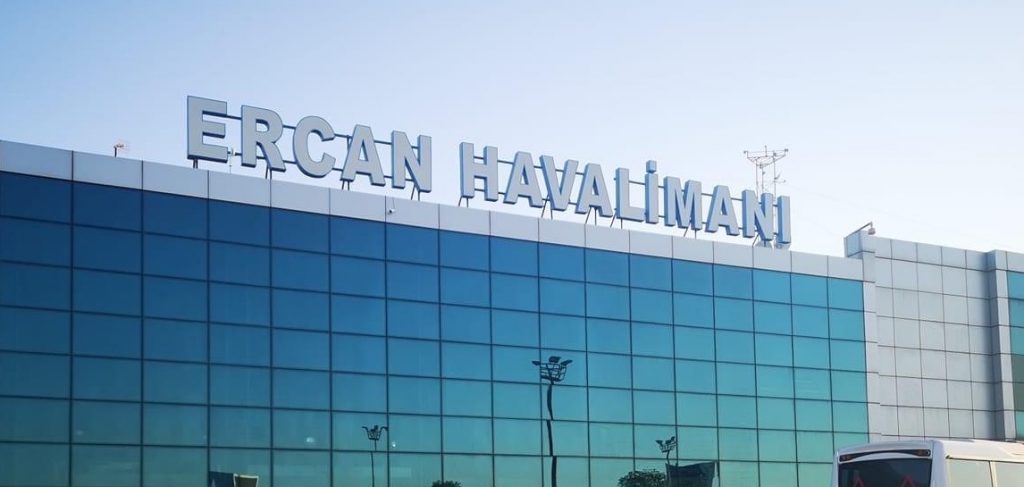
While the vast majority of states and airlines comply with this request, airlines from Turkey and many operators of private jets do not without any legal repercussions.
All scheduled and charter flights travelling to or from Ercan, however, must first touch-down in Turkey. This adds time, cost and inconvenience to both passengers and airlines, and limits the growth of tourism, which is the TRNC’s biggest sector.
Sixteen years ago, Imair, a commercial airline from Azerbaijan, tried to overcome this problem by launching direct flights to Ercan. Over 90 passengers made the historic trip on an Imair flight from Heydar Aliyev International Airport in the capital Baku to Ercan Airport in North Cyprus on 27 July 2005.
Greek Cypriots complained to the EU about the Azeri flight and the airline was threatened with losing its EU license, forcing it to cancel all future direct flights to Ercan.
In April 2004, Britain was among the many countries to pledge to end the international isolation of Turkish Cypriots following their brave ‘yes’ vote in a referendum supporting the UN-backed Annan Plan to reunite the island. The Greek Cypriots, unsurprisingly, rejected this plan.
When it came to the crunch, at the behest of Greek Cypriots, the UK government, like the rest of the international community, was unwilling to take action to remove the unfair restrictions on North Cyprus. The UK, however, has different responsibilities in Cyprus – as a Guarantor Power it is obliged to treat the two sides in Cyprus equally.
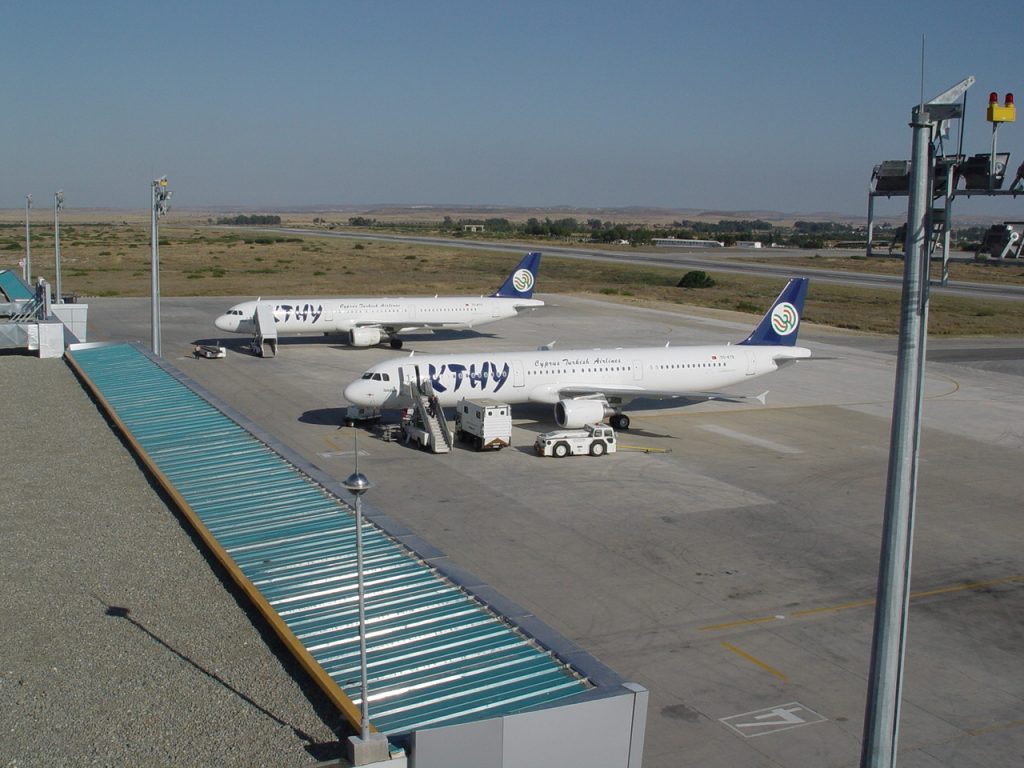
Through their national carrier Cyprus Turkish Airlines, Turkish Cypriots decided to mount a legal challenge against the UK government for refusing to allow direct flights to Ercan Airport. The High Court, while acknowledging the practical difficulties for those visiting North Cyprus, decided in 2009 that the circumstances were not exceptional enough to override international treaties. The Court of Appeal upheld the original decision in 2010.
In 2017, the British authorities added a new embargo for those heading to the UK from Ercan Airport. On the pretext of ‘regional security concerns’, the UK insists that all aircraft travelling from the TRNC not only touches down in Turkey, but that all passengers also disembark and go through a fresh security check. No other country in the world insists on this measure.
Ercan Airport has since improved its security, but the UK still refuses to lift the disembarkation rule.
-
The anomalies of international law: can’t fly direct, but it’s OK to use Famagusta and other North Cyprus sea ports
While direct flights to North Cyprus are seemingly banned, there is no such prohibition on the country’s sea ports. That aspect was established by the European Commission in its response of 18 January 2008 to a question from the European Parliament about whether it was lawful to use TRNC sea ports, given the Greek Cypriot claim that they are not open to international transport.
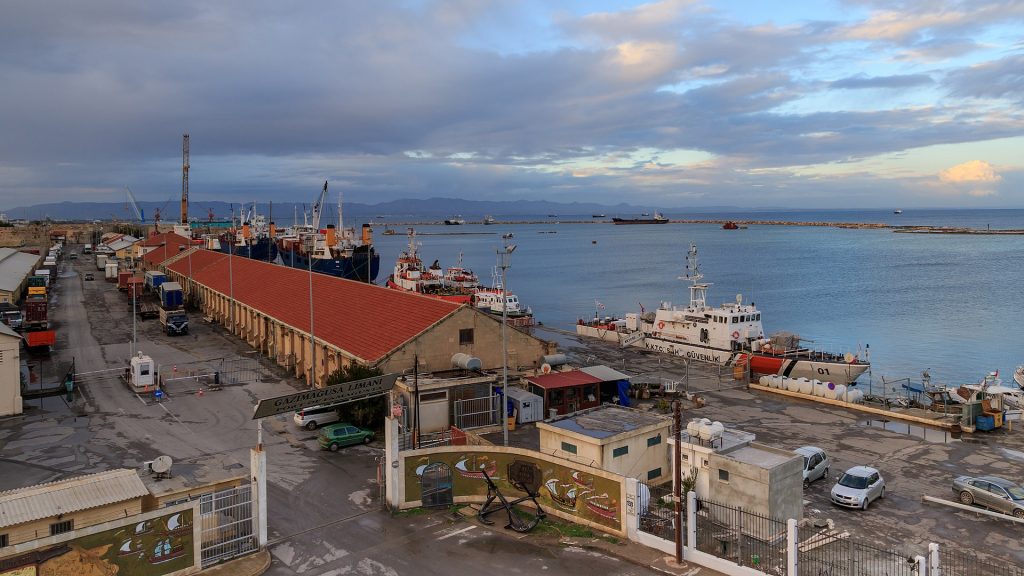
The European Commission said: “it is the Commission’s understanding that there is no prohibition under general international law to enter and leave seaports in the northern part of Cyprus”.
Judges in the direct flights case also acknowledged this in their 2010 ruling.
-
It’s a human right, but Turkish Cypriots are still banned from sports
One of the worst aspects of the embargoes are those on sporting life. Athletes have a short life span and it seems particularly cruel to use politics in sport, which deprives Turkish Cypriot sports men and women the right to compete with their peers at the highest levels in international competition.
The IOC, for example, has yet to allow individual Turkish Cypriots the right to compete under the politically neutral White Flag. They instead expect TRNC athletes such as Meliz Redif and Yiğitcan Hekimoğlu to either take out citizenship of the Republic of Cyprus or Turkey to compete.
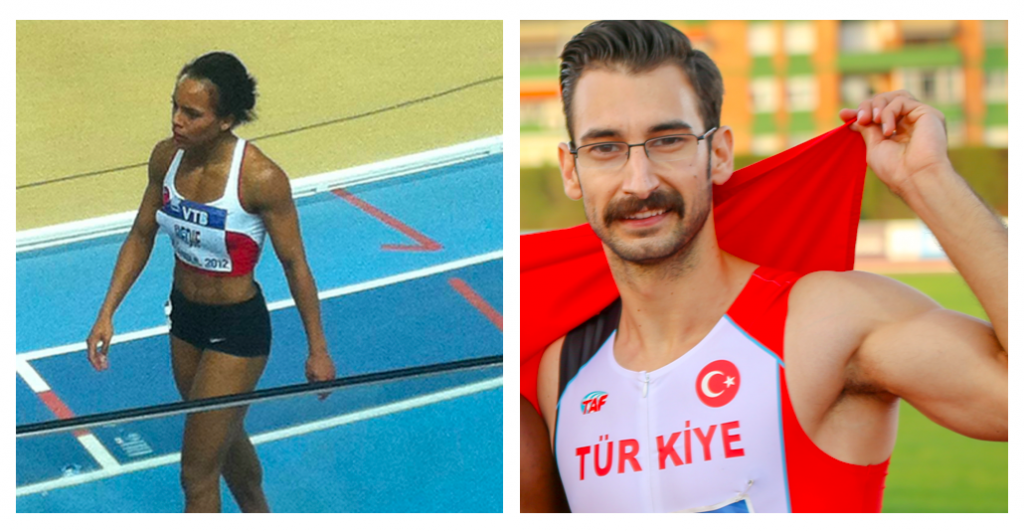
This absurd policy is not in keeping with the spirit of the Olympics, and falls foul of one of the ‘Fundamental Principles of Olympism’, as set out in the IOC Charter (Clause 4, 2020 edition):
“The practice of sport is a human right. Every individual must have the possibility of practising sport, without discrimination of any kind and in the Olympic spirit, which requires mutual understanding with a spirit of friendship, solidarity and fair play.”
Similarly, global football body FIFA fails by its own ethics by refusing to admit the Cyprus Turkish Football Association (CTFA) as a member.
The CTFA was formed back in 1955 after Greek Cypriots ousted Turkish Cypriot teams from the Cypriot league. The Republic of Cyprus Constitution also allows for separate sporting arrangements of the two communities, but still FIFA refuses to embrace players and teams from North Cyprus.
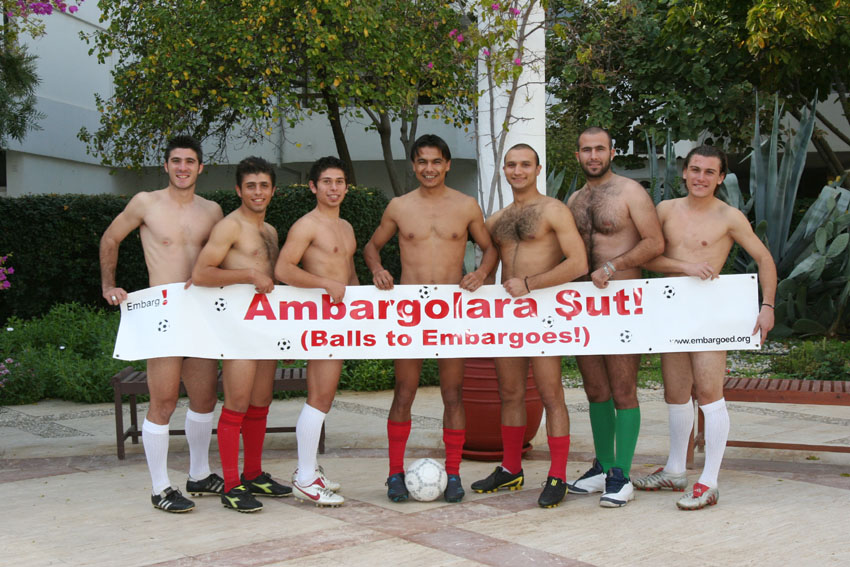
Outrageously, Turkish Cypriots are even banned from playing friendly football matches with FIFA-registered football clubs and nationals teams, which would face financial penalties and possible expulsion for doing so. Yet such discrimination is forbidden by FIFA’s own Charter:
“Discrimination of any kind against a Country, private person or group of people on account of race, skin colour, ethnic, national or social origin, gender, language, religion, political opinion or any other opinion, wealth, birth or any other status, sexual orientation or any other reason is strictly prohibited and punishable by suspension or expulsion.” [FIFA Charter, 2015 edition, Section 1 General Provisions, Clause 3]
-
Mersin 10, Turkey – North Cyprus relegated to a PO Box
After the Cyprus War of 1974, the island was formally split into two ethnic territories: a Turkish Cypriot North and a Greek Cypriot South. This separation was confirmed in the Population Exchange Agreement of 1975, followed by the High Level Agreements of 1977 and 1979.
All UN settlement plans for Cyprus since the 1970s are based on there being two ethnic territories in Cyprus – a feature accepted by the entire international community. It therefore begs the question, ‘why does the world refuse to deal directly with Turkish Cypriots and their homeland of North Cyprus?’
The international isolation of North Cyprus impacts every aspect of Turkish Cypriot life, including communications. There is, for example, no direct postal service to North Cyprus. Everything is re-directed via Turkey.

Those sending mail to North Cyprus must include the line ‘Mersin 10, Turkey’ in the address, to ensure the post reaches the intended recipients, essentially reducing the whole of North Cyprus to a PO box in Turkey.
There are similar problems with telecommunications: all landlines and mobile phones in North Cyprus carry Turkey’s +90 country code. Up until a few years ago, Greek and Turkish Cypriots couldn’t even call each other due to objections from the South Cyprus authorities.
In recent years, to avoid customer confusion, many international telecommunications providers have started to distinguish between North and South Cyprus on the bills and packages they offer. As the TRNC calls go via Turkey, their rates and tariffs, and the call and data costs are significantly different to those for customers in South Cyprus.
-
The impact of the ban on direct trade
The international isolation of North Cyprus means the country’s economy and the income of Turkish Cypriots is vastly smaller than those of Greek Cypriots and others living in South Cyprus.
Wherever possible, the Greek Cypriot authorities try to prevent or obstruct direct trade with North Cyprus. We have seen this with the EU which, after initially committing to direct trade with North Cyprus, fell in line with Greek Cypriot demands and passed the Green Line Regulation, requiring all goods intended for sale in the EU to go via South Cyprus. This cumbersome regulation means extra time, costs and inconvenience for Turkish Cypriot traders and their EU buyers, making their goods less competitive.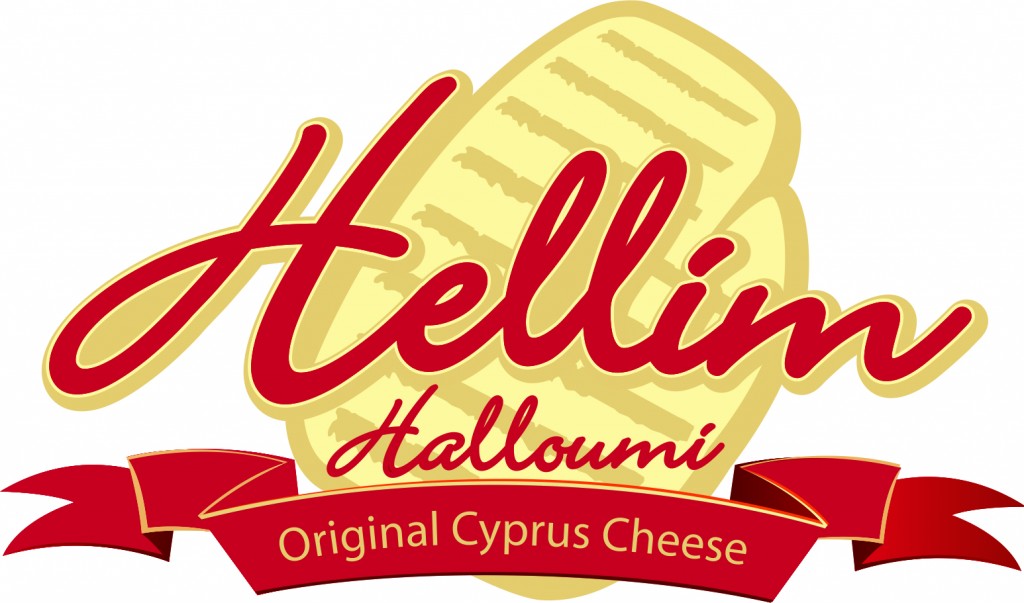
After nearly 17 years of EU membership, Turkish Cypriots are still unable to sell some of their staple goods to the bloc, such as hellim cheese, because Greek Cypriots refuse to allow the EU to inspect North Cyprus dairy producers or for the certification provided by the TRNC authorities to be accepted in the EU.
Turkish Cypriots do not have these restrictions when trading with non-EU territories, but as the TRNC is not recognised as a sovereign state, it cannot sign free trade agreements. As a result, there are more taxes on exports from North Cyprus, making them more expensive for buyers and consumers.
For brands wishing to do business with the TRNC, they face strong-arm tactics by the Greek Cypriot officials trying to put them off. Some corporations walk away, while others are forced to carry a variation of their international brand name for a time, such as Burger King (Burger City) and Vodafone (Telsim Vodafone).
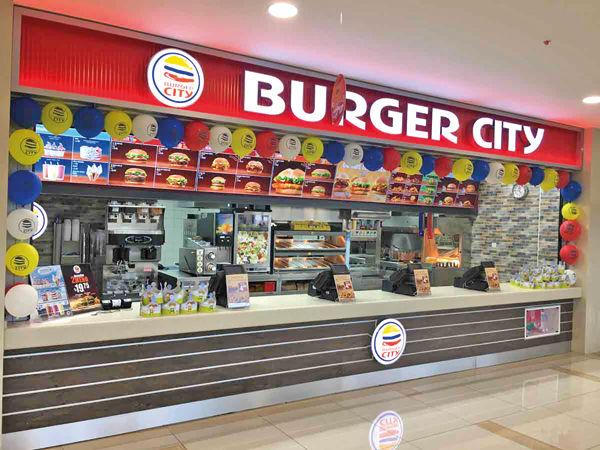
Thankfully, an increasing number of global brands are dealing directly with TRNC businesses, giving them licences to operate as franchises or distributors. These include BMW, clothing chains Guess and Zara, Gloria Jean’s Coffee, Sbarro, and Whirlpool.
-
An embargo even on education
Turkish Cypriots were administering their own education long before the TRNC was declared. This right is actually enshrined in the 1960 Constitution of the Republic of Cyprus. Education is also a fundamental human right.
In 1979, Turkish Cypriots established their first university – Eastern Mediterranean University in Mağusa / Famagusta. Today, it is rated among the world’s top 1,000 universities.
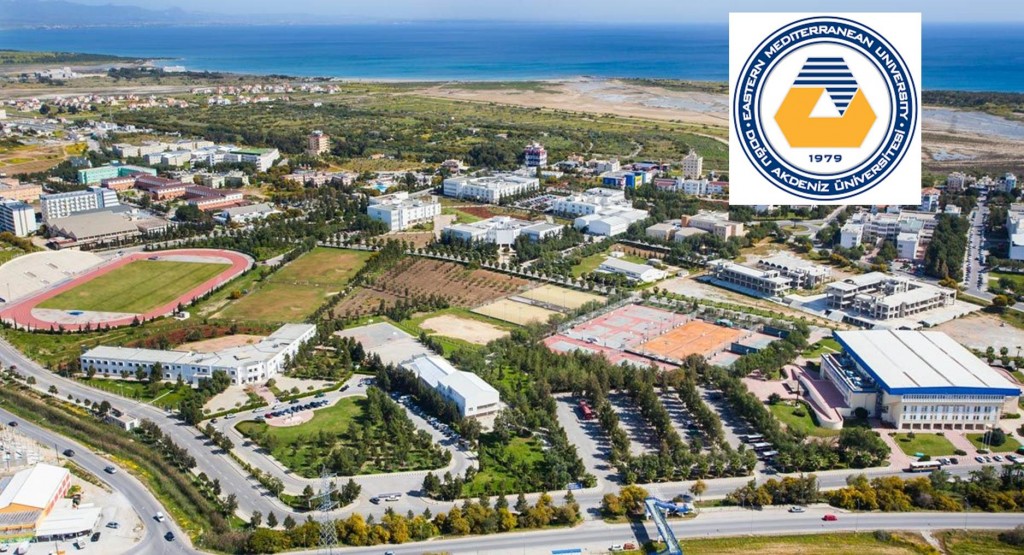
There are 18 other universities in the TRNC, including several affiliated to universities in Turkey. These institutions are not only providing higher education to local people, but also to over 90,000 international students.
Higher education is the second biggest revenue-generating sector in North Cyprus, and for this reason the Greek Cypriot government is determined to try and undermine it.
The South Cyprus authorities have stopped TRNC universities from being part of the Bologna Process, which harmonises the standards for higher education qualifications in the 48 different member states across Europe.
Slowly but surely, however, these embargoes are being chipped away by different faculties, universities and academic associations in North Cyprus:
- – The Association of North Cyprus Biologists (Bio-Der) joined the European Countries Biologists Association (ECBA) in 2006;
- – Northern Cyprus’ Educational Sciences Association (KEB-DER) joined the European Educational Research Association in August 2010;
- – The law faculties of the three universities of Northern Cyprus were accredited by European Law Faculties Association (ELFA);
- – Near East University and Eastern Mediterranean University are members of European University Association;
- – Girne American University and Cyprus International University are members of European Council for Business Education (ECBE);
- – North Cyprus’ Higher Education Planning Evaluation Accreditation and Coordination Council (YÖDAK) is now part of four important European bodies: the European Association for Quality Assurance in Higher Education (ENQA, 2007), the International Network for Quality Assurance Agencies in Higher Education (INQAAHE, 2009), the UK – National Academic Recognition Information Center (UK-NARIC, 2009) and the Central and Eastern European Network of Quality Assurance Agencies in Higher Education (CEENQA, 2013).
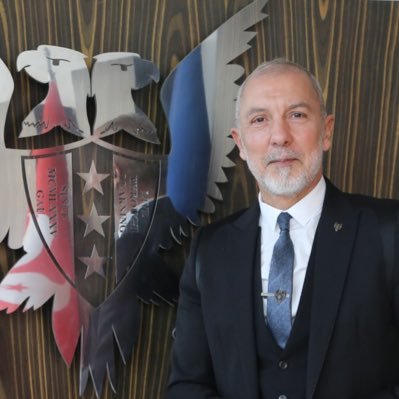
Serhat Akpınar, the founding rector of Girne American University. Photo via Twitter
The Central and Eastern European Network of Quality Assurance Agencies in Higher Education (CEENQA) held its meeting in Northern Cyprus between 17-18 May 2019. Twenty six quality assurance institutions from 20 countries participated at the meeting.
Sadly though, the Greek Cypriots don’t give up on their aggressive campaign against the education sector in North Cyprus. One of their current big aims is to block the recognition of diplomas from TRNC universities.
In December 2020, Serhat Akpınar, the founding rector of Girne American University, told local media that TRNC degrees and diplomas issued to students from Egypt, Jordan, Iran, Iraq, and the United Arab Emirates will no longer be recognised by their home countries.
This development, if left unchecked, could lead to a serious reduction in the number of foreign students applying to study at universities in the TRNC.
-
International artists rip up the cultural embargoes on North Cyprus
We all know the embargoes on Turkish Cypriots and their homeland of North Cyprus are long past their sell-by date. They are not only hugely unjust, but are also driving enmity between the two communities.
One area of hope for Turkish Cypriots is in the cultural arena. If the response of international artists is anything to go by, the lobbying efforts of Greek Cypriots in South Cyprus and its diaspora to intimidate artists into not performing in North Cyprus are increasingly failing.
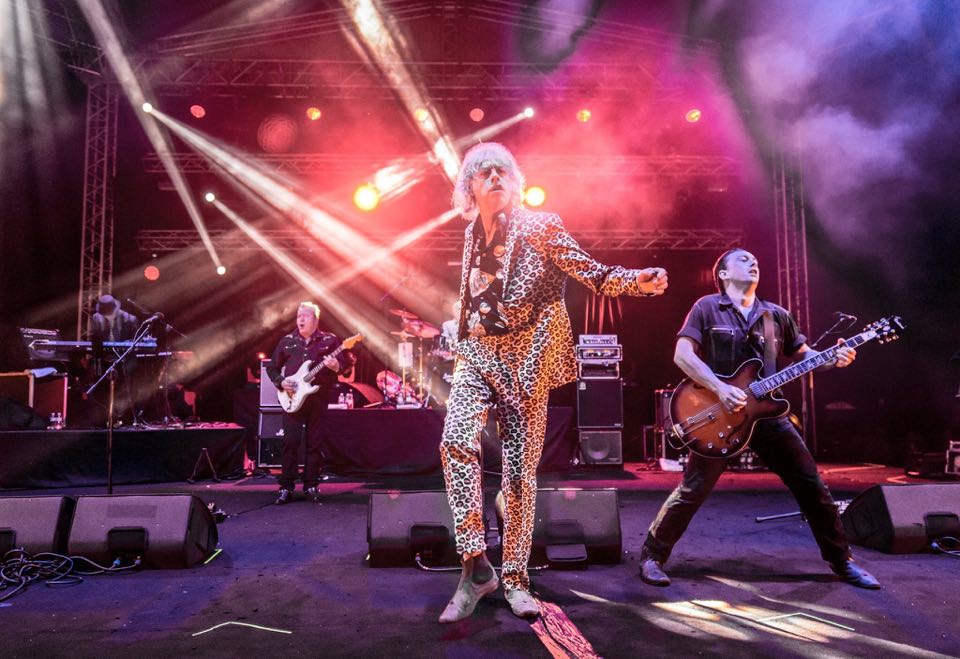
For every high profile name that pulled out of performing in the TRNC, such as Jennifer Lopez, Julio Iglesias, and SNAP!, there are many more who are happy to come and play.
Some of the notable musicians, bands and artists to have visited and performed in North Cyprus in the past 20 years include: Artful Dodger, Aswad, the Belarussian Ballet Company, Berlin Art Ensemble, Billy Paul, Boomtown Rats, Buika, Cesera Evora, David Russell, Deep Purple, Dionne Warwick, George Benson, Gloria Gaynor, Goran Bregoviç, Inner Circle, Joshua Redman Quartet, Jose Carreras, Julian Marley, Kelis, Levi Roots, Los Paraguayos, Monica Molina, Natalie Cole, Paco Peña, Paris Hilton, Paul van Dyk, Pink Martini, Randy Crawford, Ras Kwame, Rojas and Rodriguez, Samantha Fox, Sean Paul, Sister Sledge, Stephen Marley, Tiesto, The Weather Girls, Tinie Tempah, Tom Jones, Twinkle Brothers, UB40, Yasmin Levy, the Wailers, Wax Poetic, and many, many more.

Main photo, top, of protestors at human rights group Embargoed!’s 2006 protest Gagged in Brussels, 26 April 2006. Photo © Embargoed!

